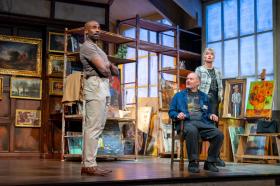Les Dawson made his debut on Opportunity Knocks and went on to host the program on the BBC shortly before he and it died. After life’s fitful fever Les sleeps well. Not so for Opportunity Knocks: it has been summoned from the grave by the dark arts of Lord Andrew Lloyd Weber and his impish familiar, Graham Norton. The name has changed but the format remains the same: contestants audition and viewers vote for the winner. The difference this time around is that the winner gets a role in one of Lloyd Webers’ West End musicals. Kevin Spacey has waxed hostile to what he called the BBC’s ‘13-week promotions’ for these musicals and it is not my intention to rehearse his arguments here.
His Lordship can hardly be blamed for having an eye for the main chance. Producing a show for the theatre is almost as nerve-shredding and expensive a business as going to one. The ticket prices alone cause the heart to race and that is before you stump up for the program, the interval G & T and the increasingly compulsory pre or post-theatre menu at the bistro round the corner. What if someone with enormous hair sits in front of you? Or a class full of schoolkids with phones and crackling bags of sweets? Not every West End theatre has benefitted from the Delfont Mackintosh effect: many venues remain hot and cramped with budget airline amounts of legroom. What if the understudy is on? What if the show is rubbish anyway? What if you not only wasted all that money but kissed away a perfectly good evening that could have been spent doing something else?
Opportunity Cost is a term which economists apply to the possible consequences of making a commercial decision: if you invest all your money in dogs then you miss out on the opportunity of investing in Cats! The opportunity cost of going to the theatre has been high in recent decades principally because of the rise of the multiplex cinema with air conditioning, plush seats and comfort food. Going to films has always been less risky: even if the film turns out to be rubbish, it doesn’t really matter because it wasn’t that expensive and you can always find someone who’s seen it to commiserate with. Comparing notes, even negative ones, with friends and colleagues adds an extra layer of value to the experience.
Lloyd Weber has done nothing about West End ticket prices but the series of BBC programs has significantly reduced the opportunity cost of his musicals for millions of people. You already know what you’re going to get because you’ve seen it on telly and, if you voted, you have an investment of sorts in the show before you pay your money. Unfortunately consistency and quality don’t always go together: McDonalds food tastes the same all over the world and Su Pollard was once beaten into second place by a singing dog on Opportunity Knocks. Not that I am comparing Connie Fisher or Lee Mead to performing pooches of course.




